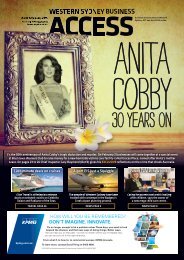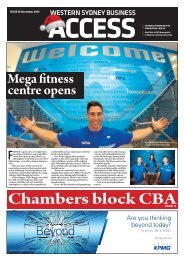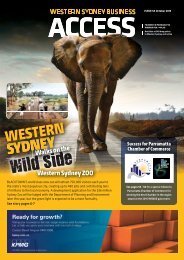RECRUITMENT
WSBA September 2015
WSBA September 2015
Create successful ePaper yourself
Turn your PDF publications into a flip-book with our unique Google optimized e-Paper software.
PROFESSIONAL DEVELOPMENT<br />
Why encourage informal learning?<br />
Research realigns the role of<br />
performance appraisals<br />
FEEDBACK<br />
MOST employees, from any profession<br />
or sector, will spend time talking<br />
about their job with friends, family<br />
and colleagues.<br />
In most cases, if they are in the same job<br />
area with any consistency, they will pick up<br />
and read articles and books that relate to<br />
their profession, either casually in an ad-hoc<br />
way, or even in a more structured approach,<br />
with some self-improvement goals in mind.<br />
All this is called informal learning, and<br />
while it clearly has the potential to have a<br />
positive impact on a person’s performance<br />
in the workplace and their long-term career<br />
development, its formal role has never been<br />
fully acknowledged and has certainly never<br />
been rigorously measured or quantified.<br />
Traditionally, the development of<br />
employee knowledge has been considered<br />
a top-down practice, where senior leaders<br />
determine the learning needs of employees<br />
and create and deliver structured development<br />
programs.<br />
This is despite the acknowledgement that<br />
employees choosing to engage in informal<br />
learning tend to have high levels of confidence<br />
in their own ability and competence.<br />
“It has had a little bit of a negative definition,<br />
for no good reason really, but informal<br />
learning is everywhere and in so many things<br />
we do,” says Karin Sanders, a professor and<br />
head of the school of management at UNSW<br />
Business School.<br />
“Even if you have a dinner, you are talking<br />
with your friends and that can be a part of<br />
informal learning. You hear something, you<br />
share knowledge and you are keeping up to<br />
date.<br />
“Informal learning had a place in the<br />
development part of HR, but also it was not<br />
measured, and if you want to know more<br />
about it, and its impacts, then you need to<br />
measure it in a community of practice.”<br />
Link to formal functions<br />
Informal learning was the focus of a recent<br />
research project by Sanders and former<br />
UNSW Business School colleague Timothy<br />
C. Bednall (now at Swinburne University<br />
of Technology), in collaboration with Piety<br />
Runhaar from Wageningen University, The<br />
Netherlands.<br />
Taking a sample of 238 employees from<br />
54 work teams in six Dutch vocational education<br />
training (VET) schools, the researchers<br />
looked at informal learning with the goal of<br />
understanding how it might receive more<br />
formal recognition within an organisation’s<br />
human resource management (HRM) practice,<br />
and how the HR system could further<br />
encourage employees.<br />
More specifically, the study looked at the<br />
effects of perceptions of performance appraisal<br />
quality and HRM system strength on<br />
three informal learning activities: reflection<br />
on daily activities, knowledge sharing with<br />
colleagues, and innovative behaviour.<br />
“We also made a distinction between<br />
keeping up to date, also known as the reflecting<br />
on your own behaviour,” says Sanders.<br />
“These things, you can do by yourself, but<br />
other informal learning activities are more<br />
done in a team situation. Knowledge sharing<br />
– you can’t do that by yourself. And there is<br />
an element of reciprocity, because you are<br />
giving and taking feedback.”<br />
The study collected two waves of survey<br />
data from respondents a year apart. The<br />
only selection criteria was that employees<br />
had to work at one of the six schools, and<br />
so the breakdown was between teachers<br />
(84.9%), teaching assistants (8.8%), team coordinators<br />
(2.1%), with the remaining 4.2%<br />
classified as “others”.<br />
Data was collected via self-filling software,<br />
with response rates just over 50%. The<br />
questionnaire measured informal learning<br />
activities by the respondents in four areas:<br />
reflection on daily activities, knowledge sharing<br />
with colleagues, innovative behaviour<br />
and also performance appraisal quality.<br />
The idea behind the inclusion of performance<br />
appraisal was to see if this link to the<br />
formal HR function could be a practical way<br />
of integrating informal learning in a positive<br />
way into the HR system.<br />
The results bore this out, revealing that<br />
the quality of performance appraisal from<br />
line managers had a positive association with<br />
all three informal learning activities in the<br />
second wave, and with reflection in the first<br />
wave.<br />
This article was first published in BusinessThink,<br />
the online business analysis<br />
journal of UNSW Business School.<br />
WWW.WSBA.COM.AU<br />
New hub<br />
offers training<br />
options<br />
SOLUTIONS<br />
PARRAMATTA College is one of regions<br />
most established names in adult training<br />
and education. Backed by over 25 years<br />
of experience, the College has launched<br />
a new training facility that caters for the<br />
demand for professional development and<br />
workplace training courses in Sydney’s West.<br />
The Western Sydney Skills Hub assists businesses<br />
to meet the training needs of their staff<br />
locally, providing the ideal learning environment<br />
for business leaders, managers, staff and<br />
individuals who wish to further their careers.<br />
Focused on training that is of exceptional<br />
quality, the College has established a learning<br />
hub that provides the local business community,<br />
and individuals, with the opportunity to<br />
maximise organisational outcomes or their<br />
career through learning.<br />
The Western Sydney Skills Hub can work<br />
with you or your business to develop a custom<br />
corporate training solution through our<br />
work skills assessment process.<br />
The Hub offers flexible training opportunities,<br />
and the venue is also available for<br />
hire. Rooms can be utilised for training or<br />
planning sessions, corporate presentations<br />
and off-site events. The facilities include a<br />
computer lab, Wi-Fi, kitchen and breakout<br />
areas and catering.<br />
Contact the Parramatta College on<br />
9687 2072 or visit www.parramattacollege.com.au<br />
WESTERN SYDNEY BUSINESS ACCESS SEPTEMBER 2015<br />
33






